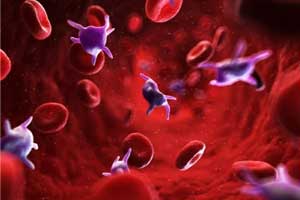- Home
- Editorial
- News
- Practice Guidelines
- Anesthesiology Guidelines
- Cancer Guidelines
- Cardiac Sciences Guidelines
- Critical Care Guidelines
- Dentistry Guidelines
- Dermatology Guidelines
- Diabetes and Endo Guidelines
- Diagnostics Guidelines
- ENT Guidelines
- Featured Practice Guidelines
- Gastroenterology Guidelines
- Geriatrics Guidelines
- Medicine Guidelines
- Nephrology Guidelines
- Neurosciences Guidelines
- Obs and Gynae Guidelines
- Ophthalmology Guidelines
- Orthopaedics Guidelines
- Paediatrics Guidelines
- Psychiatry Guidelines
- Pulmonology Guidelines
- Radiology Guidelines
- Surgery Guidelines
- Urology Guidelines
No need to treat Isolated mild/moderate thrombocytopenia : Study

Pediatric patients with isolated mild or moderate thrombocytopenia(TP) may not need a specialist referral to hematology in most circumstances, according to a study published in the journal Pediatrics. The majority of patients with mild or moderate TP normalized platelet counts within 3 months. Mild isolated thrombocytopenia without a bleeding history or abnormal physical findings did not require interventions from pediatric hematology-oncology whereas moderate isolated TP cases rarely required interventions.
Isolated thrombocytopenia is a common pediatric laboratory finding among patients with a bleeding or bruising history as well as being an incidental laboratory finding. Pediatric patients with congenital or acquired viral infections may develop TP because of alterations in platelet production or platelet destruction.
Charles Schlappi and his associates conducted a study to test the hypothesis that patients with isolated asymptomatic mild TP would not progress to require an intervention from a pediatric hematologist-oncologist.
The study included 113 patients referred to pediatric hematology-oncology for isolated thrombocytopenia which continued for 5 years. Initial, lowest, and current platelet counts along with clinical course and need for interventions were recorded. TP was categorized as mild (platelet count: 101–140 × 103/μL), moderate (platelet count: 51–100 × 103/μL), severe (platelet count: 21–50 × 103/μL), and very severe (platelet count: ≤20 × 103/μL).
Key findings :
- Eight of 48 patients (17%) referred for initial mild isolated thrombocytopenia progressed to moderate TP at 1 visit.
- At present, 2 of these patients have moderate thrombocytopenia, 17 remain with mild TP, and 29 patients have resolved thrombocytopenia.
- Nine of 65 patients (14%) referred for moderate TP progressed to severe or very severe TP on 1 occasion.
- At present, no patients have severe thrombocytopenia, 18 remain with moderate TP, 14 improved to mild TP, and 33 have resolved thrombocytopenia.
- Only 3 patients required interventions from a hematologist, whereas 10 patients required therapy from other subspecialties.
The study concluded that only 3 identified patients (3%) with mild to moderate TP required an intervention from a hematologist to improve platelet counts. Patients with isolated mild TP with a normal bleeding history and physical examination findings frequently have normalized their platelet counts within 1 month.

Disclaimer: This site is primarily intended for healthcare professionals. Any content/information on this website does not replace the advice of medical and/or health professionals and should not be construed as medical/diagnostic advice/endorsement or prescription. Use of this site is subject to our terms of use, privacy policy, advertisement policy. © 2020 Minerva Medical Treatment Pvt Ltd